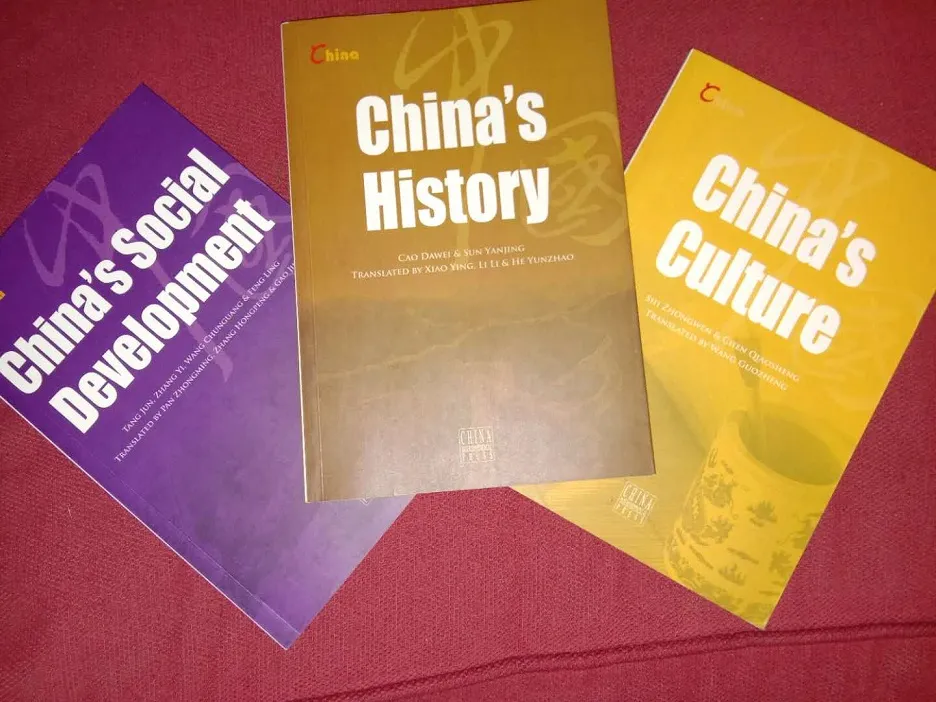
Around the beginning of 2018, I set out on a "read everything China publishes about itself" kick (which ended up being a formative moment in my view of China, which grew increasingly negative from that point forward, but I digress) This started with the Sinopedia series, a 12-part collection of what I suppose I would classify as half-textbook-half-documentaries, from China Intercontinental Press, recognizable for their rather repetitive titles (each volume is China's _______). For some time I've pondered how to review these, because reviewing each one seemed wasteful (they're about 150 pages each, with large print, absolutely no working bibliography or citations, and a lot of illustrations), but trying to review them all as a whole didn't seem to work either. After long deliberation I've decided to break the series into 4 sets of three and review each set.
Set 1: Enlightening - These insightful volumes actually managed to hold my attention and made me want to continue reading the series.
Set 2: Useful - Though not exactly gripping, these books were useful enough that I have referred back to them and cited them several times.
Set 3: Semi-useful - I didn't get much out of these except useful data and statistics, but for a China-watcher they're good for that much.
Set 4: Absolute rubbish - Unmasked, unapologetic heaps of Chinese State-sponsored propaganda, and they didn't even have the decency to make their propaganda convincing.
In this article, I'll take a look at Set 1, consisting of China's History, China's Culture, and China's Social Development.
China's History
I won't deny, this one starts off with the same jingoistic tone one would expect from a state-sponsored work about the "Great and Glorious History" of the self-anointed "Central Nation." It begins with the tried-and-debunked claim of China's 5,000 (ahem) "uninterrupted" years of history, and they're not shy about boasting China is the only nation to claim this (a thesis the book itself later debunks on page 39 with the explanation of Ying Zheng (Qin Shihuang)'s conquest of six neighboring states to establish the first Chinese Empire). They follow this up with a declaration that China's territory has always been the largest in the modern world until the modern age (which is bonkers unless you try to claim the Tibetan Empire was part of China, and considering how many times the Tibetan Empire sacked their petty little Chinese vassal-state's capital I think that's a rather ridiculous claim). The book goes on to deny slavery or serfdom has ever existed in Chin (to further this lie, the author refers to slaves in China as "maids" and "workers" throughout the first hundred pages, never using the term "slave"), after claiming China invented farming and metallurgy, and all of that is on the first page.
Chinese civilization is the only ancient civilization in human history without any interruption.
China's territory ranks number 3 in the world today and up until the modern age, had always been the largest...
...Different from the prevailing slavery system and the serfdoms in the European feudal manors, the intensive cultivation marked with ironware and farm cattle was developed in the basins of the Yellow River and the Yangtze River in Ancient China. (p. 1)
On page 3, the author doubles down on the proof that the book was written in a universe where Spock has a beard, by insisting China is to be credited for creating Western civilization, that China is a democracy, and that this has been so since 1949. This is followed up with the declaration that this "democracy" was achieved by China gaining "independence" from Western Powers (the book is not clear about which Western Power Sun Zhongshan's Kuomingtang supposedly came from), and threw off Western ideological shackles in order to embrace Marxism.
...So, who wants to tell them Marx was European?
The book has multiple authors and it seems that the point where they switch out for the first time is around p. 94 (where the description of the Sui and Tang Dynasties begins), because this is where the tone changes slightly. For one thing, this is where the book dispenses with the above-mentioned tapdancing around the use of the word "slave" to describe those held in bondage in China (seriously, no one believed it never existed there anyway). For another thing, the jingoism dies down to background noise, though it still rears its head from time to time, such as the statement that the Sui Dynasty did not "conquer" the Northern Tribes but was the first dynasty where the Northern tribes "accepted" their "rightful" Han rulers (p. 64), and the spin that the Tibetan King Songtzen Ghampo "submitted" to Chinese rule when he acquired the Chinese emperor's daughter as a slave concubine (p. 105). Frankly, the direction in which that tribute was paid makes it rather obvious that the chain of command ran the opposite direction.
If you don't mind a few token examples of nationalistic tubthumping to keep the underwriters at Zhongnanhai happy (indeed, they are unavoidable in anything written in China), the book becomes a rather useful crash course in Chinese history after that. Of course, every chapter is riddled with the "Han good / everyone else bad" mentality that forms the CCP's central ideology, but it does give a reader an idea of how China went from a few warring states gathered between the Yellow and Yangtze Rivers, into its present... eh, "glory."
China's Culture
This one was by far the best of the series. Much like Ben Chu's Chinese Whispers and Paul Midler's What's Wrong With China, it examines what aspects of China's culture and values make the Chinese behave this way instead of that. But unlike those two, it's written from China's perspective. What impressed me the most, though, was the fact that the authors are actually willing to acknowledge shortcomings in China!
The Chinese, in particular those who have not influence [sic] by the modern Western ideologies, are generally not good at abstract logical thinking. Instead, they prefer to express their own thoughts by connecting everyday life in metaphor, analogy and assumption. (p. 23)
Let this sink in. A Chinese writer, on the payroll of the Chinese government, writing a Chinese textbook, actually acknowledged (gasp) flaws, and imperfections, in China.
It boggles the mind, I know.
Sarcasm aside, everything from the Chinese that compares themselves to the West seems to swing back and forth, depending on what generation it was written in, between "Wolf Warrior" nonsense that treats all non-Chinese nations as petty tributaries, jealous of "the Great and Mighty China," or self-deprecating penitential tracks that are to China what Malcolm X's "Lookatcherselves" was to Black Americans. To see a Chinese textbook that is able to objectively place Chinese and Western thinking side-by-side, with neither brainless pride nor self-debasement but a simple "these are the West's priorities, these are ours," is a rare thing indeed. In fact, I'll go a step farther and say if more of China's books about themselves were like this, I'd have a hell of a lot more respect for the country.
Much of the book follows this pattern. Rather than trying to tout the "superiority" of China's culture, the crux of the text is a frank assessment of what events in history formed what values in the collective psyche of the Chinese, and it makes many of the Zhonghua Minzu's more baffling traits suddenly make sense. In essence, if one wants to get an understanding of the nuances of Chinese thinking, but wants a source with a bit less negative view than Midler's book, this book, though less exhaustive than Midler's should suffice in a pinch.
China's Social Development
China's distinct historical and cultural tradition determines a different course of development for Chinese society from that of the more developed Western nations and of the rising newly industrialized countries and regions in Asia. (P. 2)
This one reads a bit like a second volume of China's Culture, focusing primarily on the twentieth century transition from what most people consider "traditional China" to the China of today (or, if you are an expat, the transformation from "Beijing's China" into "Shanghai's China"). Though, as one would expect, it paints rather a dismal picture of that transformation. The shadow of Mao, who slaughtered 62 million Chinese in the name of his great experiment, hangs over every page. The book does its best to try and dress up the past 50 years of changes as "progress.," but to no avail. Pages 42, 53 and 100 both speak of the rising per capita income of China, while avoiding the fact that it is still FAR below the UN's poverty line. Pages 63 & 84 praise individual communities for their response to the SARS outbreak of 2003 (namely, walling themselves off and refusing admittance to anyone from outside), and 84 goes on to praise the government for setting up a quarantine facility by bringing infected patients into an occupied residential complex and locking them in with the residents. And of course, pages 47 - 52 outline how China's Hukou
ID system works (summary; it codifies a birthplace-based caste system in the style of The Hunger Games into law) and tries to actually claim this facilitates, rather than eliminates, social mobility.
Still, if you cut through the nonsensical self-flattery, there is useful information here. China's demographic situation (and the resulting economic woes that they are finally losing the ability to cover up) is given careful attention, the transition from arranged marriages to high divorce rates is not whitewashed, and the closing of the book is a glimpse into the weaknesses of China's healthcare system.
So Who Should Read Them?
In the case of these three, I would say anyone who found Will China Dominate the 21st Century and/or Is the American Century Over will find these useful, and the middle one, China's Culture, is a must-read for anyone who is going to be going to China (or dealing with the Chinese on a large scale) in the near future.
Of course, given that they are hard to get anywhere outside of China, that makes "read this before you go" a little difficult, but I digress.

Works Cited
Cao Dawei & Sun Yanjing. Trans. Xiao Ying, Li Li & He Yunzhao. China's History. 2010, Beijing. China Intercontinental Press.
ISBN 978-7-5085-1302-7
Shi Zhongwen & Chen Qiaosheng. Trans. Wang Guozheng. China's Culture. 2011, Beijing. China Intercontinental Press.
ISBN 978-7-5085-1298-3
Tang Jun, Zhang Yi, Wang Chunguang & Feng Ling. Trans. Pan Zhongming, Zhang Hongpeng & Gao Jin'an. China's Social Development. 2010, Beijing. China Intercontinental Press.
ISBN 978-7-5085-1306-5